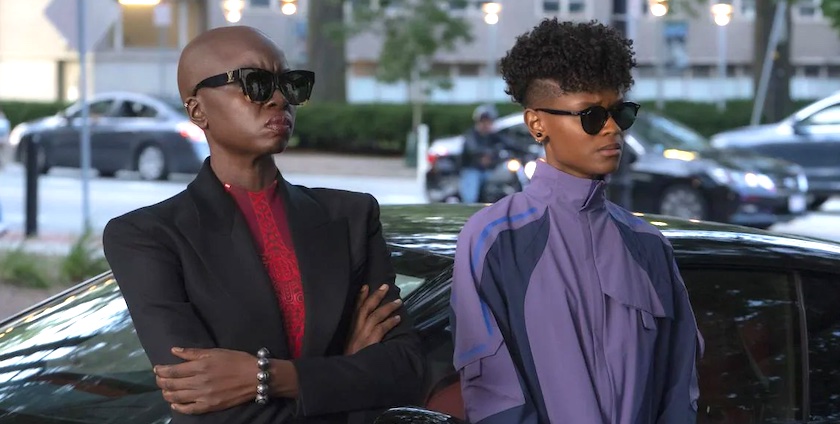Black Panther: Wakanda Forever’s opening is the most emotional introduction to any film in the Marvel Cinematic Universe thus far. Tasked with, somehow, continuing the Black Panther franchise after the passing of Chadwick Boseman, returning director Ryan Coogler (who also penned the screenplay with Joe Robert Cole) wisely decides to forego any type of adventure or spectacle-driven opening to tackle T’Challa’s absence from the top. It’s a heartbreaking way to kick off – and it should be. And so, one of the film’s primary elements is set: an ode to the beloved man himself and to what he delivered to fans around the world as the royal Wakandan.
Of course, Wakanda Forever still has an important chapter in the overall MCU to tell. T’Challa’s departure is a major factor, but the universe’s overall narrative must continue to evolve in a major way as the fourth phase closes. Coogler and Robert Cole have penned an ambitious screenplay that plays in Marvel’s broad universe while zeroing in on intimate character beats. It’s an impressive balance to nail; taking us from large-scale to small-scale storytelling, and back again, with surprising ease.
On the large scale, there’s the introduction of another new corner in the MCU: the underwater kingdom of Talokan. King of the Talokanil is Namor, the film’s villain, played with vigour by Mexican actor Tenoch Huerta. Add Namor to the list of the MCU’s top-tier villains. In a similar approach to Michael B. Jordan’s Erik Killmonger in the first Black Panther film, Coogler and co. paint Namor with empathetic layers. He is far from a conniving baddie that simply wants to see the world burn; Namor’s choices and frustrations are understandable, and arguably even logical, with an agenda driven by pain and vengeance, and a desire to defend with pre-emptive strikes. A well-crafted character, brought to life with a great performance by Huerta.
Namor’s story, including his cultural heritage, is wonderfully drawn to both parallel and collide with Wakanda and our heroes. The screenplay takes great care in clarifying why there’s more than just right and wrong in this unfolding feud, and as with Black Panther, there’s certainly more than enough resemblance to real-world chapters of cultural divides and oppression to serve up discussion points for those willing and interested.


Moving into a much more pivotal position is Shuri, T’Challa’s younger sister. Letitia Wright, reprising the role, certainly has a lot more heavy lifting to do this time around, carrying the weight of grief and guilt after T’Challa’s departure whilst having to face the responsibilities that come with her family line and the rise of an all new threat. Wright aces it, pulling us into her character’s emotional arc.
Mostly strong performances all round here, as you’d expect from a cast that includes the likes of Danai Gurira, Winston Duke, Lupita Nyong’o, and Martin Freeman, among others. I’ll also spotlight Angel Bassett, who returns as Wakanda’s Queen Mother, Ramonda. Bassett absolutely dominates her scenes. Her United Nations scene, as one example, has her packing a punch. Ramonda has lost so much, but her internal strength holds firm.
Wakanda Forever is firing on all cylinders when it’s focusing on Wakanda and Talokan. When it sidesteps, however, things can get a little shaky. Not by much, but it’s notable. The CIA tangents provide strands of universe development and furthers one particular character, but ultimately feel like digressions, slowing down momentum as the big clash approaches. Sure, at least we have Martin Freeman to hang out with during these parts, but it almost feels like a narrative requirement as opposed to a much-needed extension of the main thread.
I have a somewhat similar critique when it comes to the inclusion of Riri, aka Ironheart. Now, before everyone jumps on me for that, my criticism isn’t at all directed to Dominique Thorne, who puts in an energetic performance in the role; only to how the character is thrown into the narrative. I personally thought that the way Riri is quickly set up in the film is almost flimsy when compared to the care that’s gone into other narrative points. The character is also tasked with providing some of the film’s laughs, but I found that her tidbits of humour feel slightly out-of-place with the film’s tone. After being introduced and taking part in an action sequence, Riri is seemingly dragged around, failing to add much in the way of plot. In Wakanda Forever, the character seems, unfortunately, sidelined. Perhaps Ironheart needed her introduction elsewhere.


Wakanda Forever is one grand production, a film with clear craftsmanship on display from the many behind-the-scenes players. The production design, costumes, make up, sets, sound design – all fantastic. I also want to applaud composer Ludwig Göransson – who won an Academy Award for the first film’s score – for again delivering on the music side of things. His score here is sumptuous. As for the visual effects, the big Disney budget, of course, provides the resources for eye-popping visuals, but, the sheer number of FX shots does leave for some notable missteps. A few cartoony-looking shots did stand out to me, but I can imagine that would be of very little concern to most viewers.
While I did have a few small qualms, I have no hesitancy in saying that I was left both moved and very satisfied with Wakanda Forever once the credits had rolled. The pressure on Coogler has been undeniable. The film arrives to the weight of expectation, it must feel like an adequate next chapter in an overall franchise that is 29 films deep, and it must respectfully deal with the tragic loss of a beloved star. Taking all that into account, Wakanda Forever is quite an accomplishment. Coogler and his team have managed to craft a heartfelt tribute to Boseman and a strong chapter in the MCU.













